The Benefits of Choosing Quartz Countertops
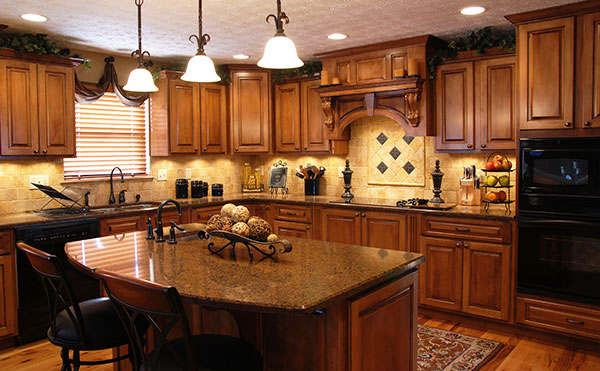
The countertops set the overall atmosphere in your kitchen.
Nowadays, the choice of beautiful, practical, and cost-effective solutions for your kitchen design is so diverse and bewildering that you may find it rather difficult to decide on the most advantageous option for your home. It’s the countertops that have the greatest impact on the overall look and feel of your kitchen, so choosing a countertop design and material that will perfectly suit the rest of your home’s interior style, as well as your needs and aesthetic preferences, is of paramount importance for the convenience and the appeal of your surroundings. You can take your pick from decorative laminates, concrete surfaces, butcher blocks, ceramic tiles, and many other traditional or innovative materials.
Solid surfaces and natural stones have been long considered the standard for stylish and classy kitchen designs. Quartz, however, is rapidly gaining popularity as a high-end countertop material, praised for its low maintenanceMaintenance is the routine care, inspection, and repair of a... More, high durability, and endless color choices. Whether you are setting up a new home or planning a kitchen remodel, quartz countertops are definitely worth considering. So, it’s a good idea to get familiar with the pros and cons of quartz countertops in order to make an informed decision about your interior design.
Benefits of Quartz Countertops
Quartz countertops are engineered stone products made of 95% natural quartz granules and 5% polyester resins and color pigments. The natural properties of the quartz crystals and the specifics of the engineering process result in a durable and exquisite surface that has many valuable benefits:
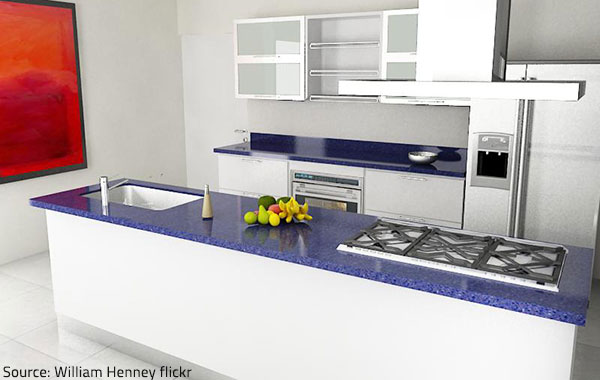
Quartz countertops come in an amazing array of colors and impart a contemporary, fashionable look to your kitchen design.
Aesthetic Value
Quartz products are distinguished for their natural beauty, clarity, and depth that make them very appealing to the eye. The appearance of quartz surfaces depends mainly on the size of the quartz crystals they contain – finer granules result in a smooth consistent appearance, while larger crystals create a more flecked look, similar to granite surfaces. The specifics of the manufacturing process, however, determine the unique features of the engineered quartz countertops:
- Wide variety of quartz countertops colors – since the choice of available color pigments that can be used in the manufacturing process is virtually unlimited, quartz countertops are available in a dazzling array of colors – from fire red and leaf green to earthy browns, blacks, and creams, with speckles and veining that resemble the look of granite or marble. Whether you like colors that are bright, bold, and strong or colors that are muted, soft, and warm, you can have your quartz countertop match your preferences exactly. Besides, you will be able to easily coordinate the color of your quartz kitchen countertops with the rest of your home décor;
- Uniform patterns – natural stones have random patterning, so when you buy slabs of granite or soapstone, for example, there may be great variations in the color pattern from one slab to the other, as well as from one end of the slab to the other. Quartz countertops, on the other hand, have a consistent color pattern throughout the entire surface. This is so because quartz can be crafted with a controlled appearance – the manufacturer can control the production process to ensure that the slab has the exact color, texture, and pattern that you like;
- Flexibility in terms of finishes and edge profiles – quartz countertops allow for a variety of edging options and finishes. Whether you prefer a polished surface or the satin look of a honed finish, etc., the appearance of the finished engineered quartz countertop will be rich and elegant, adding unique charm to the ambience. Besides, quartz is easy to work with and offers various designer possibilities to perfectly match your interior visions.
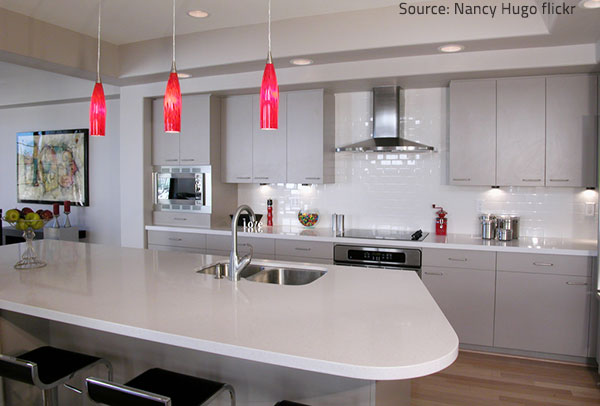
Although quartz countertops are not indestructible, they are extremely durable and resistant to scratches, cracks, and stains alike.
Durability
Quartz is a very hard material, largely composed of minerals. It ranks 7th on the Mohs scale of mineral hardness which accounts for the extreme durability of quartz kitchen countertops. They are scratch resistant and less vulnerable to chipping and cracking than most natural stones. Short exposure to heat won’t damage the surface either as quartz is scorch-resistant. Excessive heat, however, may cause cracking to occur due to the rapid temperature change, so you are recommended to use hot pads or trivets under pots, pans, or griddles. Also, have in mind that quartz is not entirely scratch proof – a careless slip of the knife will cause no damage but extreme weight and/or force may ruin your quartz countertop.
Quartz is stronger than most natural stones, resists staining and corrosion, and shows little signs of wear and tear, so it makes for a good work surface suitable for heavy everyday use.
Non-Porous Character
A thick resin is used in the manufacturing process to bind the quartz minerals together and create a durable and non-porous surfaceNon-porous surfaces are surfaces that do not absorb liquids ... More. The lack of porosity is one of the biggest advantages of quartz countertops. It results in:
- Hygienic surfaces – the non-porous quartz surfaces won’t harbor bacteria, germs, and other harmful microorganisms (such as moldMold is a type of fungus that grows in damp or humid conditi... More, for example). Besides, many manufacturers mix an antimicrobial compound with the quartz during the production process to further help fight germs and reduce the opportunity for bacteria growth. So, quartz countertops are very sanitary and pose no potential health threats. In fact, they have been rightfully certified by the National Sanitation Foundation as a safe food preparationPreparation is the steps taken to ready a property, equipmen... More surface;
- Easy cleaning – keeping the hygienic quartz surfaces clean requires very little time and effort. You don’t need any specific cleaning agents, bacteria-preventing soaps, or other specialty products. Just wash your quartz countertop with mild soap and water and wipe it dry – easy as that. However, be careful to keep chemicals that are highly acidic or alkaline away from quartz surfaces as they may sustain damage when exposed to such products;
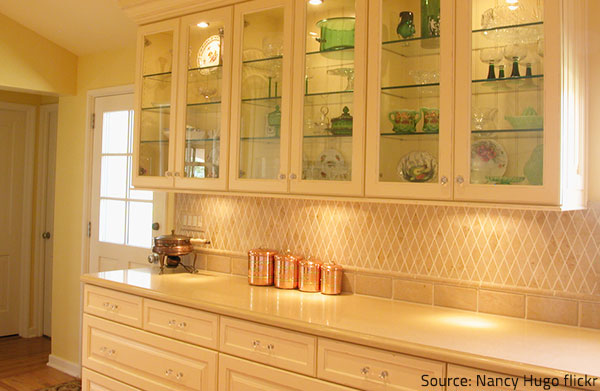
Quartz surfaces are hygienic, easy to clean, and stain resistant which makes them appropriate for food preparationPreparation is the steps taken to ready a property, equipmen... More and consumption.
- No need for resealing – quartz counters will not stain from common kitchen spills, such as coffee, tea, wine, or fruit juice, as the non-porous material won’t absorb liquids. This means that quartz does not require periodic resealing of the surface or other routine maintenanceMaintenance is the routine care, inspection, and repair of a... More procedures to preserve its beauty and functionality. Granite and marble countertops, on the other hand must be sealed regularly to prevent staining and bacteria growth.
Quartz is beautiful, strong, and maintenance-free when compared to other countertop materials. Besides, it offers an eco-friendly solutionA solution is a homogeneous mixture of two or more substance... More for your kitchen design. (Engineered quartz countertops contain 95% quartz, which is an inexpensive and abundant natural material. Furthermore, quartz produces less waste than other materials and can be repurposed if you decide to remodel your home.) Choosing quartz countertops will bring increased value to your home and will provide you with the comfort you need and the charming ambience you wish for.
However, you should also have a look at the other side of the coin before making your final choice.
Disadvantages of Quartz Countertops
Despite its many advantages, engineered quartz has some drawbacks as well:
- Considerable weight – quartz slabs are significantly heavier than other stone slabs, so you need to take into account relevant structural issues before installing quartz countertops, especially on upper floors. You should also make sure that your kitchen cabinets are sturdy enough to support quartz countertops;
- Visible seams – when quartz countertop pieces are joined together, seams are evident. The uniform color and patterns of the quartz slabs result in seams that are less visible than the seams in other natural stone countertops (such as granite, for example), but not as undetectable as the seams in solid surfaces;
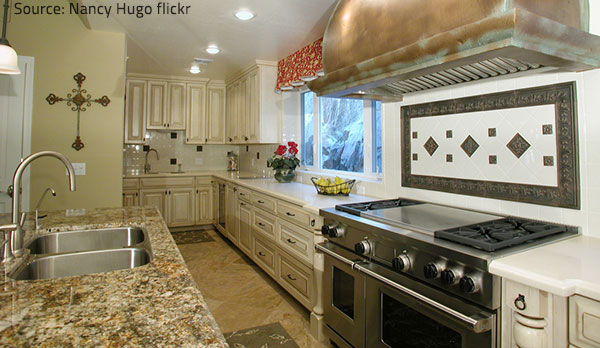
Quartz countertops add unique beauty to the ambience.
- Limited heat tolerance – as already mentioned, prolonged exposure to heat can damage a quartz countertop. Direct sunlight should also be avoided, as it may cause discoloration;
- Sensitivity to certain household products – acidic and alkaline chemicals, such as rustRust is a reddish-brown oxide that forms on iron or steel du... More removers, aluminum brightening compounds, heavy duty cleaners, bleach, etc., can easily damage quartz surfaces;
- Unnatural appearance – however beautiful quartz surfaces may be, the uniformity and consistency of their patterns and colors make it evident that they are man-made products, only mimicking natural stone. Engineered quartz countertops have unparalleled strength and great performance but they lack the grandeur and the natural feel of granite, marble, and other natural stone countertops;
- Cost – quartz countertop prices are higher than the cost of solid surface countertops, so choosing quartz countertops for your home is not your cheapest option.
Last but not least, remember that quartz countertops are very durable, but not immune to damage, so they may scratch, chip, or crack under certain circumstances.
Appearance, durability, and ease of maintenanceMaintenance is the routine care, inspection, and repair of a... More are all important factors to consider when choosing an appropriate countertop material, of course, but the cost of the new counters is often the major determinant in the selection process.
Cost of Quartz Countertops
Although quartz is abundant and cheap, the intricate processing sequenceSequence is the specific order or progression of steps taken... More required to turn the quartz crystals into a countertop increases the cost of the final product. Quartz countertops cost is comparable to the cost of granite countertops – between $50 and $150 per square foot. The final cost depends on the availability of the material and the complexity of the installation process. The price of quartz countertops, however, has been dropping in recent years, as they have gained a lot of popularity and the number of certified manufacturers and distributers who offer them has increased considerably.
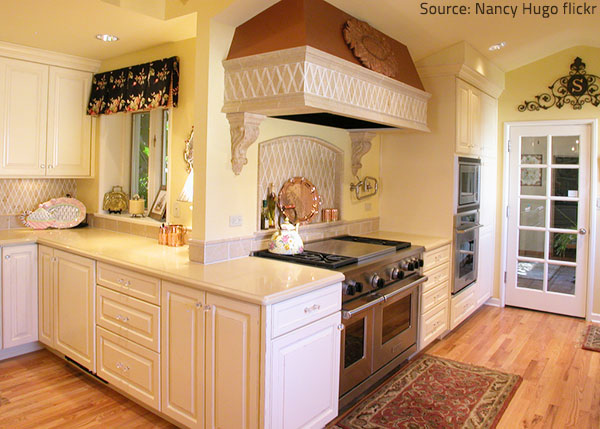
Engineered quartz countertops provide a beautiful, practical, and cost-effective solutionA solution is a homogeneous mixture of two or more substance... More for your kitchen design.
To sum it up: Quartz is cheaper than luxurious natural stones, but more expensive than laminate and solid surfaces. Even standard granite countertops may cost less than premium quartz countertops. Have in mind though that unlike granite, quartz surfaces don’t need periodical resealing and special cleaning products, so once installed, they will incur no further maintenanceMaintenance is the routine care, inspection, and repair of a... More expenses.
If you set your mind on quartz countertops, make sure to have them professionally installed. You will be able to enjoy the stylish look of your durable and easy to maintain kitchen countertops for many years to come.











